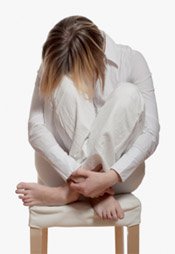Menopause Depression
Roughly 10% of women in midlife experience menopause depression. While it's great that the majority of women avoid it, it can be difficult if you are one of the 10%.
You may have a sensitivity to changing hormones (affiliate link) causing you to experience menopause and depression.
Irritable or Depressed?
While many women say that midlife is the best time of their lives (forget high school!), they also notice that they are more easily annoyed than in the past.
While it is no fun to feel like you can't control your emotions, a higher irritability rate is natural and does not mean that you are experiencing depression.
Consider all of the challenges that you are facing in your life right now.
You may be raising teenagers, caring for your parents, balancing your mortgage(s), and paying for your children's college education all while planning for your not-too-distant retirement.
That is a lot to be stressed out over!
But, if your negative moods last longer than two weeks or are greatly affecting your life, you might be suffering from menopause depression.
Menopause, Depression, and Estrogen
There are three main types of estrogen, and one type, estradiol, acts as a mood lifter. It is like a hormonal anti-depressant, raising our serotonin activity in the central nervous system and making us feel good.

But, a low level of estrogen does not seem to be the only cause of depression for menopausal women. In fact, scientists are still not exactly sure why menopause depression occurs.
As a supplementary treatment, estrogen has been shown to help women feel better if they are on other depression therapies. But by itself, boosting your estrogen level is not a long-term cure for menopause depression.
There are a few lifestyle changes and supplements that can make you less susceptible to menopause depression, but be sure to see your doctor for a treatment plan that fits you.
Lifestyle Help
Here are some lifestyle tips that can help to treat your menopause depression. Be sure to use these along with the treatment prescribed by your doctor.
- Meditate Start your day with 15 minutes of quiet mediation. Use calming music, or just be still and quiet. You may also want to try a yoga class. Many yoga classes incorporate meditation as part of the practice. Yoga is a great way to work your body and relax your mind.
- Take a Walk in the Sun Being in the sun will naturally increase your serotonin, a chemical that makes you feel good. And if your mood is affected by the seasons, it will help you avoid sesonal affective disorder. If you are affected by seasonal affective disorder and you live in a cold climate, consider investing in a light therapy box that treats the disorder. A light therapy box gives off a bright light similar to natural light. Sitting near the light for a few minutes each day can help you to feel better. For more information, see the Mayo Clinic page on light therapy.
- Be With People While Facebook and email are great, you need some face to face time with loved ones. Don't just call or email - we are physical beings, and we need to share physical space with people to stay healthy.
- Be Creative Fight menopause depression, and unleash the inner you! Letting your creativity run wild can help to balance your emotions and improve your mood. Write, take photographs, paint, draw, play a musical instrument, knit, scrappbook, arrange flowers, create pottery, take a cooking class. You've got lots of options!
- Free Write Don't bottle all of your feelings up. Write them down without filtering yourself. Just write whatever comes to mind- no one else has to read it. You'll be surprised at how much better you feel after having acknowledged your feelings by writing them. If you feel that your writings are too personal to even keep in a journal, you may want to have a fire and burn your entries. This is a great way to symbolically let go of thoughts that are holding you back.
- Exercise When you're feeling blue, it can be hard to motivate yourself to exercise, but exercise encourages our bodies to produce mood-boosting chemicals in our brains. It can also help you to feel more confidence in yourself, and it acts as a good distraction if you're feeling down.
- Pamper Yourself Give yourself a little extra TLC with scented candles, long baths, a lovely new outfit, or a special cup of tea.
- Sleep This may be easier said than done, but over half of menopausal women report that they experience insomnia on a regular basis. All of those lost sleeping hours can leave you feeling irritable, exhausted, and moody.
Supplements
Being deficient in certain vitamins and minerals can lead to depression. Be sure your body gets what it needs to help you feel good!
- Vitamin C
Low levels of vitamin C are associated with depression. Get your 1,000 mg per day and avoid vitamin C deficiency!
- Omega-3s
You can take this as a supplement or get them by eating ground flax seeds, walnuts, salmon, and soybeans.
Along with fighting depression, omega-3s reduce the risk of heart disease and help to prevent osteoporosis. Take 1,000-2,000 mg per day.
- Magnesium
Low levels of magnesium are associated with depression, and many people have found their depression eased within one week of taking magnesium supplements.
Magnesium will also help your bones and teeth. Take 400-1,000 mg a day. If you take too much, you may have diarrhea, so find the right dose for your body.
- Chasteberry
This herb is used to treat mild depression, hot flashes, irregular periods, and tender breasts.
- Saint John's Wort
Some studies say that this herb is as effetive as Prozac in treating mild to moderate depression. Other studies say that it's about as effective as a placebo, but with few side effects, why not give it a try?
People also take this herb to ease anxiety. Take 300 mg three times a day.
- Valerian
This herb is also a good choice for treating anxiety, and you can take this with Saint John's wort. It contains substances that give you a calming effect and ease your nerves. Take 100-300 mg a day.
- Ginkgo
Take 40-80 mg of this herb a day to boost your mood as well as improve your memory.
Return to Menopause Treatments Page
Go from Menopause Depression to Estrogen Source Homepage
Copyright © 2009- 2015 Estrogen Source. All Rights Reserved.
The information on this site is my opinion only.
Consult your doctor before acting on any information found here.
Click here to read our Privacy Policy and Disclaimer.



